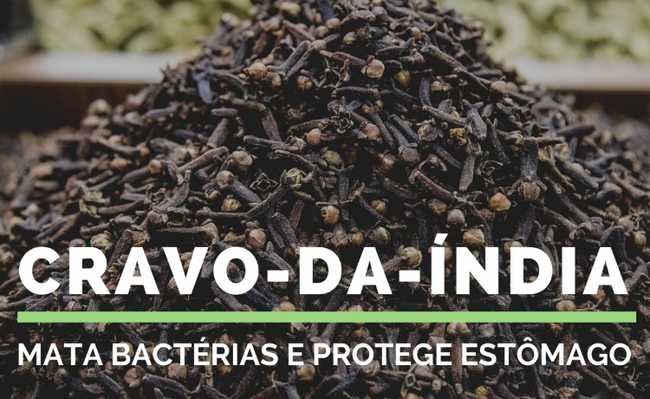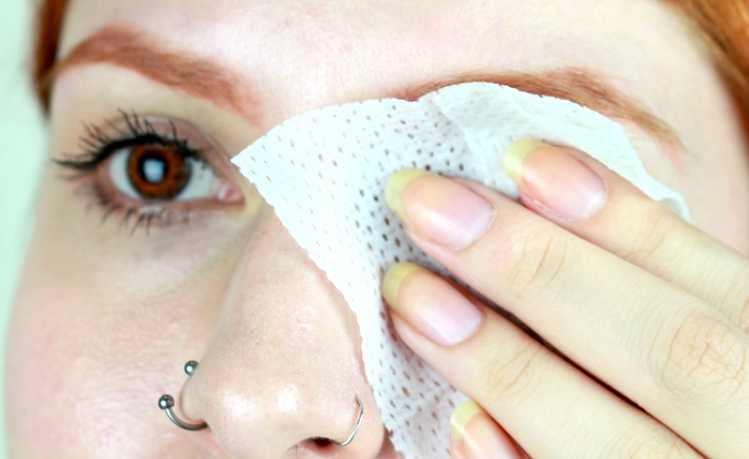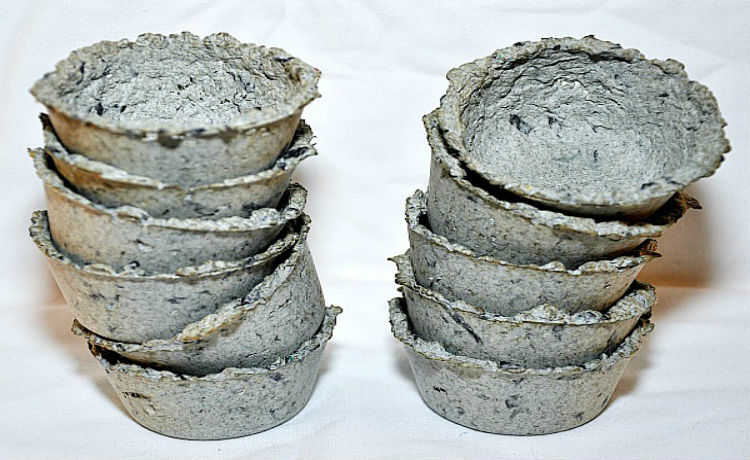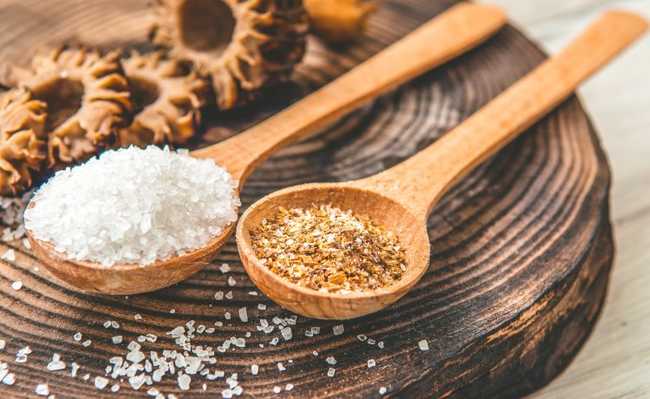17 amazing benefits of cloves
The benefits of clove and its essential oil include analgesic, anti-inflammatory, bactericidal, aphrodisiac effects and more

Clove, popularly known as clove and commonly misspelled without a hyphen: "Clove", is a spice that grows on the floral bud of the clove tree; scientifically called Syzygium aromaticum.
The word "harpsichord" comes from the Latin "clavus", which means "nail". Found in whole, ground, powdered and essential oil format, cloves are very versatile and can be used as a seasoning, an ingredient in cakes and cookies, beverages and even as a natural remedy.
- Essential Oils: A Complete Guide
In addition to its sweet and aromatic flavor, cloves and the essential oil made from it are known for their medicinal benefits, such as analgesic, anti-inflammatory, antifungal, bactericidal, aphrodisiac effects, among others. Check out a list of 17 benefits provided by clove and its essential oil:
- 16 foods that are natural anti-inflammatory
Benefits of cloves
Animal studies have found that compounds present in cloves can provide several health benefits, including improved liver health and stabilization of blood sugar levels.
Other benefits of the harpsichord include:
1. Nutrient source
Cloves contain fiber, vitamins and minerals; therefore, using whole or powdered cloves to add flavor to your food can provide some important nutrients.
- What is dietary fiber and its benefits?
Two grams or the equivalent of a teaspoon of ground cloves contains:
- Calories: 21
- Carbohydrates: 1 gram
- Fiber: 1 gram
- Manganese: 30% of the Recommended Daily Intake (IDR)
- Vitamin K: 4% of the RDI
- Vitamin C: 3% of the RDI
- Vitamins: types, needs and times of intake
Fiber can help prevent constipation and promote regularity, vitamin C can help strengthen the immune system, and vitamin K is an important nutrient for blood clotting (see more information about these components of cloves in studies 1, 2 , 3).
- What is constipation?
Manganese is an essential mineral for maintaining brain function and building strong bones.
In addition to the nutrients listed above, cloves contain small amounts of calcium and vitamin E.
2. Rich in Antioxidants
In addition to containing several important vitamins and minerals, cloves are rich in antioxidants. Antioxidants are compounds that reduce oxidative stress and may reduce the risk of developing chronic diseases.
- Antioxidants: what are they and in what foods to find them
A test-tube study found that eugenol prevents oxidative damage from free radicals five times more effectively than vitamin E, another potent antioxidant.
- What are free radicals?
In addition to eugenol, cloves contain vitamin C.
Vitamin C acts as an antioxidant in your body and helps neutralize free radicals, which are compounds that can build up and cause harmful oxidative stress. Including cloves in your diet along with other antioxidant-rich foods can help improve your overall health.
- What is vitamin C and why is it important?
3. Protection against cancer
Some research shows that compounds found in cloves can help protect against cancer. A test-tube study concluded that clove extract helped to stop the growth of tumors and promoted cell death in cancer cells.
Another study, also conducted in a test tube, had similar results, showing that clove oil concentrations caused cell death in 80% of cancer cells in the esophagus.
The eugenol found in cloves has also been shown to have cancer-fighting properties. A test-tube study concluded that eugenol effectively promoted cell death in cervical cancer cells.
However, keep in mind that these test tube studies used very concentrated amounts of clove extract, clove oil and eugenol.
Eugenol is toxic in high amounts and excessive intake of cloves can cause liver damage, especially in children. More research is needed to determine how smaller amounts can affect humans.
4. Can kill bacteria
Cloves also have antimicrobial properties, meaning they can help stop the growth of microorganisms such as bacteria.
A test tube study showed that clove essential oil was effective in fighting three common types of bacteria, including E. coli, a strain of bacteria that can cause cramps, diarrhea, fatigue and even death.
- Diarrhea Remedy: Six Home-Style Tips
In addition, the antibacterial properties of cloves can even help promote oral health. In a test-tube study, compounds extracted from cloves were found to prevent the growth of two types of bacteria that cause gingivitis.
- Ten Home Remedy Options for Gingivitis
- Gingivitis: what it is and how to treat it
Another study of 40 people tested the effects of an herbal mouthwash made from tea tree oil, cloves and basil.
- Tea tree oil: what is it for?
- Basil: benefits, how to use and plant
After using the mouthwash for 21 days, there were improvements in gum health, as well as reduction of bacterial plaque and bacteria in the mouth.
In combination with regular brushing and proper oral hygiene, the antibacterial effects of blackheads can have a benefit to your oral health.
5. Can improve liver health
Studies show that the beneficial compounds in cloves can help promote liver health. An animal study that fed rats with liver disease clove oil or eugenol showed that both mixtures improved liver function, reduced inflammation and decreased oxidative stress.
- How to do liver cleansing
Another animal study showed that the eugenol found in cloves helped reverse the signs of liver cirrhosis or scarring in the liver. Unfortunately, research into the liver protective effects of cloves and eugenol in humans is limited.
However, one study found that taking eugenol supplements for a week lowered levels of GST, an enzyme involved in detoxification that is often a marker of liver disease.
6. Can help regulate blood sugar
The compounds found in cloves can help keep blood sugar under control. An animal study found that clove extract helped to moderate the rise in blood sugar in diabetic rats.
- Diabetes: what it is, types and symptoms
- Natural Remedies Help Diabetes Treatment
Another test-tube and animal study looked at the effects of clove extract and nigericin, a compound found in cloves, on both human muscle cells and diabetic mice.
Cloves and nigericin have been found to increase the uptake of sugar from the blood into cells, increase insulin secretion and improve the function of the cells that produce it.
Insulin is a hormone responsible for transporting sugar from the blood to cells. The proper functioning of insulin is essential for maintaining blood sugar levels.
7. Improves bone health
Low bone mass is a condition that affects an estimated 43 million older adults in the US alone; and it can lead to the development of osteoporosis, which can increase the risk of breaks and fractures.
Some of the compounds in cloves help preserve bone mass. An animal study found that eugenol-rich clove extract improved several markers of osteoporosis and increased bone density and strength.
Cloves are also rich in manganese, providing 30% of the recommended daily amount in just one teaspoon (two grams) of ground cloves.
Manganese is a mineral that is involved in bone formation and is incredibly important for bone health.
An animal study found that taking manganese supplements for 12 weeks increased bone mineral density and bone growth. However, current research into the effects of blackhead on bone mass is limited to animal and test tube studies. More research is needed to determine how this might affect bone formation in humans.
8. Can reduce stomach ulcers
Some research indicates that compounds found in cloves can help treat stomach ulcers.
Also known as peptic ulcers, stomach ulcers are painful sores that form on the lining of the stomach, duodenum, or esophagus. They are most commonly caused by reductions in the protective lining of the stomach, due to factors such as stress, infection, and genetics.
In an animal study, clove essential oil was shown to increase gastric mucus production. Gastric mucus acts as a barrier and helps prevent the erosion of the stomach lining from digestive acids.
Another animal study found that clove extract helped treat stomach ulcers and had similar effects to many anti-ulcer medications. Although the anti-ulcer effects of clove and its compounds may be promising, more studies are needed on their effects in humans.
Properties of clove essential oil

Edited and resized image by Christin Hume is available on Unsplash
- What are essential oils?
9. Aphrodisiac effect
A study, carried out in laboratory rats, showed that daily oral administration of clove essential oil at different doses increased mating behavior and libido potency. The results indicated that the clove extract produced a significant increase in the sexual activity of normal male rats.
The aphrodisiac activity may be related to the existence of phenolic and steroidal compounds in the ethanol extract, substances that were observed through phytochemical studies of the extract.
10. Antidiabetic activity
The hypoglycemic effect of clove essential oil makes it a complementary natural alternative treatment or functional food for pre-diabetic patients and patients with mild diabetes, controlled with exercise and diet.
An analysis showed that it reduced malonaldehyde, a biochemical marker of oxidative stress in diabetic rat tissues (14% reduction in heart muscle) and tissue damage in the liver. The clove diet proved to be more efficient in reducing the number of necrotic cells, vacuoles and inflammation, significantly reduced the concentration of sugars and lipids in the blood in diabetic rats and restored the levels of antioxidant enzymes.
11. Anti-tumor effect
Clove essential oil inhibited between 50% and 80% of B16 melanoma cells (a type of skin cancer) in a survey. However, despite this benefit, β-caryophyllene and other clove essential oil compounds can be toxic to cells.
The same study concluded that the clove compound eugenol had no toxic effect on mice, which induced skin carcinogenesis. After treatment, there was a significant increase (75%) in survival, which suggests that clove essential oil has the potential to be a chemopreparative, having an effect both topically and orally.
12. Anesthetic and anti-inflammatory effect
Have you ever noticed that many dental offices smell like cloves? This is not for nothing. Among the pharmacological activities of clove, its application as an oral anesthetic is the most established, being used for more than four thousand years.
Clove eugenol is a safe and effective anesthetic. An analysis showed that it relaxed the muscles of a mollusc ten times more powerfully than a drug commonly used for this purpose, 2-phenoxyethanol - with the advantage of not irritating the mucosa and being easier to decompose in the environment.
Orally, eugenol significantly reduced edema in rat paws, comparable to drugged anti-inflammatory drugs. The gel made from clove buds has anesthetic activity similar to benzocaine, being an alternative to this anesthetic in dentistry.
13. Antimicrobial and antiviral activities
In one analysis, the ethanol extract of clove inhibited up to 90% of hepatitis C and herpes simplex viruses in mice. It damages the viral envelope and inhibits its replication early on. Clove essential oil has been shown to inhibit bacteria Staphylococcus aureus, Escherichia coli, Campylobacter jejuni, Salmonella enteritidis, Listeria monocytogenes and Staphylococcus epidermidis.
14. Antifungal action
Essential oils penetrate tissues about a hundred times faster than water, which increases their action potential. Analyzes showed that clove essential oil has action against fungi isolated from onychomycosis, such as Candida albicans, Trichophyton mentagrophytes, Saccharomyces cerevisiae and Aspergillus niger. It can be used topically to cure fungal infections like otitis externa and in inhalers or vaporizers for conditions like aspergillosis, which can also occasionally occur caused by A. niger.
Another analysis in vitro showed that clove essential oil inhibited fungal growth Rhizopus sp. and Eurotium repens.
But if you are thinking about applying directly to the skin, beware. Clove essential oil is very strong. To avoid reactions, try to dilute it in the proportion of five drops to a level tablespoon of carrier oil such as coconut oil, grape seed oil, among others.
- Coconut oil is good for the skin. Understand and learn how to use
- Grape seed oil: benefits and how to use
15. Action against protozoa
the protozoanTrypanosoma cruzi (causing Chagas disease) is susceptible to clove essential oil, which also has action against the Leishmania amazonensis (causing leishmaniasis), resulting in 100% mortality of protozoa of this species, according to the study.
16. Activity against lice, human scabies and dengue mosquito
An estimated six to 12 million people in the US alone suffer from lice infestations, costing the US government $367 million a year. In an attempt to contain pediculosis (disease caused by lice) a wide variety of substances have been used, such as organophosphates (malathion), carbamates (carbaryl), pyrethroids and many others. However, the continued use of these agents has resulted in the emergence of resistance, in addition to harm to human health.
Eucalyptus essential oil and clove essential oil are natural alternatives that do not have these side effects and are still very effective. Products containing clove essential oil, at concentrations of 10% or 20%, also showed repellency against the dengue mosquito.
About 300 million people worldwide suffer from infection caused by mites at some point in their lives, a condition known as scabies or human scabies. The mite penetrates the skin and causes an inflammatory reaction that causes intense itchy lesions, which can be followed by secondary infections, mainly streptococcal, which, in turn, can lead to kidney and heart disease.
These mites have already started to show biological resistance to permethrin, the main synthetic compound of drugs used with the acaricide function. Eugenol present in clove essential oil, on the other hand, according to a study, has activity in vitro acaricide and has not yet caused resistance to these mites, probably due to its synergistic effects with other clove compounds. However, it may present irritability if applied directly to the skin.
- Neem, clove and citronella repellent is a natural alternative against insects
- Research proves the effectiveness of oregano and clove oils in combating dengue larvae
17. Insecticide and natural repellent
Natural insecticides are advantageous alternatives, as they have fast action and degradation, selectivity, low cost, low to moderate toxicity and few harmful effects to plants.
The natural essential oils that have more insecticidal and insect repellent potential are citronella, cloves, vervain, cedar, lavender, pine, cinnamon, rosemary, basil, pepper and allspice.
In several studies, clove essential oil showed activity against insects of several species, including the dengue mosquito; you Culex pipiens, A. dirus, culexquinquefasciatus, Anopheles Dirus - which are other species of mosquitoes; O Sitophilus zeamais (beetle that attacks corn plantations); O S. zeamais (insect that usually affects rice crops); the banana boy (Cosmopolites sordidus Germar); O pediculus capitis (human lice); O Tribolium castaneum (beetle that eats stored grains like beans); O Dermatophagoides farinae and D. Pteronyssinus (mites that attack human skin); Cuniculi psoroptes (mites that cause scabies in mammalian animals); Japanese termites; between others.
But beware: if you are thinking of applying clove essential oil to your skin, dilute it in carrier oil (such as coconut oil, sesame oil, and grape seed oil) at least in the proportion of one drop. essential oil for a shallow tablespoon of carrier oil; or as recommended by a specialist aromatherapy therapist.
- What is aromatherapy and what are its benefits?
- Learn more: "Learn 14 benefits of clove essential oil"
write down the message
Cloves have many potential health benefits, including maintaining blood sugar and blocking bacterial growth.
As with many healthy foods, it is most effective when included as part of a healthy, balanced diet. Try to integrate a few servings of cloves a week into your meals.
You can easily incorporate cloves into many dishes. They will bring a warm and distinctive flavor to savory dishes and desserts.
You can also boil the whole cloves in water for five to ten minutes to make a cup of clove tea. And, of course, use it in aromatherapy in its essential oil format.










